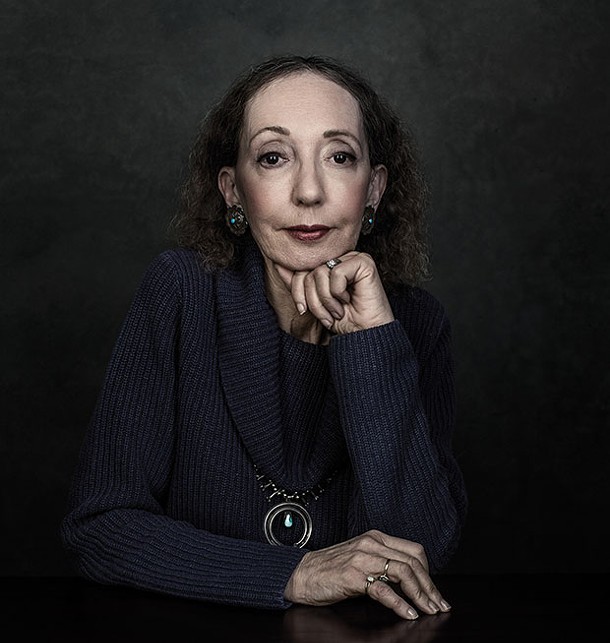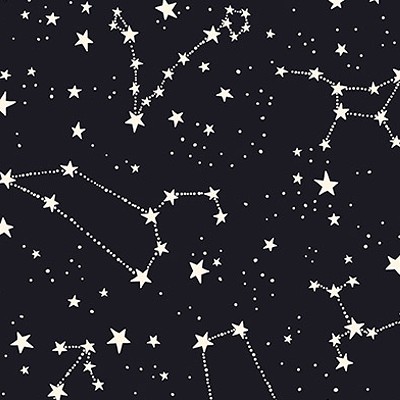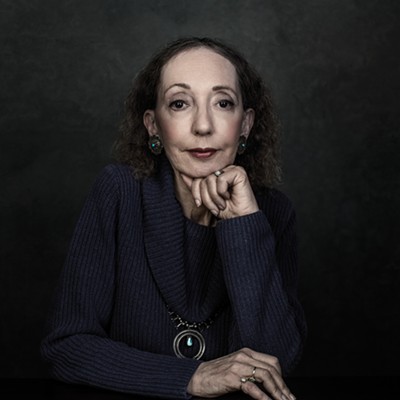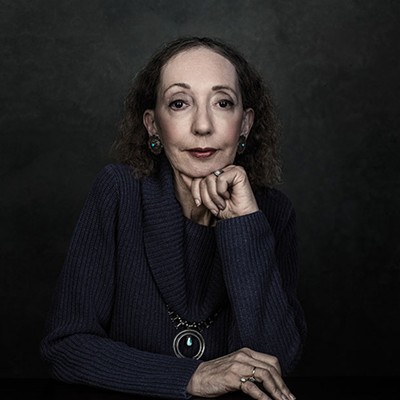Joyce Carol Oates on ethical compromise in literature, fantasy, and Twitter
"I think of Twitter as two-fold: it’s a source of constant information, linking us with others; and it is a means of expression, also constant, fleeting, impermanent."
Since publishing her first novel, With Shuddering Fall in 1962, Joyce Carol Oates has become one of America's most accomplished and prolific writers. Winner of numerous literary honors, including a National Humanities Medal in 2010, Oates recently released Beautiful Days (Ecco) a short-story collection that showcases her knack for exploring the intricacies of human behavior.
Oates will open the 2018-19 season of Pittsburgh Arts & Lectures' Ten Evenings series, Sept. 24 at Carnegie Music Hall in Oakland.
Oates recently answered questions via email for City Paper.
Many of the characters in Beautiful Days seem ethically compromised. One of the themes seems to be the compromises made in order to justify behavior. Were you at all exploring the current moral compass of the country?
“Ethical compromise” is as old as Genesis — or perhaps older! Human interactions often involve conflict, stress, struggle, resolution — though sometimes there are no resolutions, only compromises. But sometimes our struggles lead us to a more complex awareness of others & of ourselves, as in the first story in the volume, “Fleuve Bleu” in which a love affair seems to have permanently altered two people who hadn’t anticipated so significant a change in their lives.
Two stories stand out because they seem so different than most of your work. “Les Beaux Jours” and “Fractal” would fit a fantasy or science fiction magazine. Can you talk about the fantasy (and fantastic) aspect of these stories?
The stories move from relatively realistic to surreal or speculative as the volume progresses. The most “experimental” stories are at the end. But there are hints of the surreal or dreamlike in most of the stories. The stories you mention belong to a category that might be called “psychological realism” — the settings may be speculative, but the human reaction is “realistic.” Since we spend many hours of our lives in the realm of the unconscious, when we sleep, it is not far-fetched to consider that we are all navigators of the dreamlike sequestered within us.
In his New York Times review of your debut novel With Shuddering Fall, John Knowles described the story as “a whirlpool of violence … in a world caught in a paroxysm of hate and destruction.” Knowles also wrote, “This material is not as garish as it sounds because of the clarity, grace and intelligence of the writing.” Is this the theme of your body of work — finding a measure of clarity in chaos?
This might be said of my work — or, indeed, of most works of art. We do seek clarity, moral significance, & meaning in art, imposing a coherent structure upon the waywardness of life.
You are remarkably consistent, usually publishing a book, either a novel or short-story collection, every year. Is there pressure — either self-imposed or otherwise — to regularly publish (and write)?
No, I don’t think so. I have always loved reading, and so writing is a natural consequence of reading. The writer wishes to communicate with an audience, however diverse, scattered, and “invisible” it is. I tend to alternate novels with story collections, & amid the novels, shorter & longer novels. I am now trying to write a novella. ... Surprisingly, this is a difficult form for most writers.
You're very active on Twitter. Do you enjoy trying to marshal your thoughts in such a concise form? Does the brevity of the form ever transfer to your fiction writing?
I think of Twitter as two-fold: it’s a source of constant information, linking us with others; and it is a means of expression, also constant, fleeting, impermanent. I am sorry that Twitter, like so much in our lives, has become politicized. It was not nearly so, at the start. More, Twitter was an arena for playfulness, comedy, surreal exchanges. The first Twitter account I followed was Steve Martin — he tweeted often in those days, and was brilliantly funny. And totally non-political.
Twitter opens windows and doors to us otherwise shut. If you follow, for instance, any of the many accounts through the U.S. of police surveillance, for instance, you will be shocked and disturbed to learn how commonplace police misconduct is, not only involving black youths but homeless and mentally ill persons whose lives are off the radar for most mainstream media. There are numerous “animal accounts” — some of them alarming and upsetting, some delightful and heartwarming. I have made some wonderful friends on Twitter but probably all of us feel that we spend too much time on this transient and inevitably somewhat superficial activity.
However, if Twitter can lead us to meritorious books, films, music, art, theater — that more than justifies the expenditure of time. And there is always a place in our hearts for one more kitten or puppy video.
Oates will open the 2018-19 season of Pittsburgh Arts & Lectures' Ten Evenings series, Sept. 24 at Carnegie Music Hall in Oakland.
Oates recently answered questions via email for City Paper.
Many of the characters in Beautiful Days seem ethically compromised. One of the themes seems to be the compromises made in order to justify behavior. Were you at all exploring the current moral compass of the country?
“Ethical compromise” is as old as Genesis — or perhaps older! Human interactions often involve conflict, stress, struggle, resolution — though sometimes there are no resolutions, only compromises. But sometimes our struggles lead us to a more complex awareness of others & of ourselves, as in the first story in the volume, “Fleuve Bleu” in which a love affair seems to have permanently altered two people who hadn’t anticipated so significant a change in their lives.
Two stories stand out because they seem so different than most of your work. “Les Beaux Jours” and “Fractal” would fit a fantasy or science fiction magazine. Can you talk about the fantasy (and fantastic) aspect of these stories?
The stories move from relatively realistic to surreal or speculative as the volume progresses. The most “experimental” stories are at the end. But there are hints of the surreal or dreamlike in most of the stories. The stories you mention belong to a category that might be called “psychological realism” — the settings may be speculative, but the human reaction is “realistic.” Since we spend many hours of our lives in the realm of the unconscious, when we sleep, it is not far-fetched to consider that we are all navigators of the dreamlike sequestered within us.
In his New York Times review of your debut novel With Shuddering Fall, John Knowles described the story as “a whirlpool of violence … in a world caught in a paroxysm of hate and destruction.” Knowles also wrote, “This material is not as garish as it sounds because of the clarity, grace and intelligence of the writing.” Is this the theme of your body of work — finding a measure of clarity in chaos?
This might be said of my work — or, indeed, of most works of art. We do seek clarity, moral significance, & meaning in art, imposing a coherent structure upon the waywardness of life.
You are remarkably consistent, usually publishing a book, either a novel or short-story collection, every year. Is there pressure — either self-imposed or otherwise — to regularly publish (and write)?
No, I don’t think so. I have always loved reading, and so writing is a natural consequence of reading. The writer wishes to communicate with an audience, however diverse, scattered, and “invisible” it is. I tend to alternate novels with story collections, & amid the novels, shorter & longer novels. I am now trying to write a novella. ... Surprisingly, this is a difficult form for most writers.
You're very active on Twitter. Do you enjoy trying to marshal your thoughts in such a concise form? Does the brevity of the form ever transfer to your fiction writing?
I think of Twitter as two-fold: it’s a source of constant information, linking us with others; and it is a means of expression, also constant, fleeting, impermanent. I am sorry that Twitter, like so much in our lives, has become politicized. It was not nearly so, at the start. More, Twitter was an arena for playfulness, comedy, surreal exchanges. The first Twitter account I followed was Steve Martin — he tweeted often in those days, and was brilliantly funny. And totally non-political.
Twitter opens windows and doors to us otherwise shut. If you follow, for instance, any of the many accounts through the U.S. of police surveillance, for instance, you will be shocked and disturbed to learn how commonplace police misconduct is, not only involving black youths but homeless and mentally ill persons whose lives are off the radar for most mainstream media. There are numerous “animal accounts” — some of them alarming and upsetting, some delightful and heartwarming. I have made some wonderful friends on Twitter but probably all of us feel that we spend too much time on this transient and inevitably somewhat superficial activity.
However, if Twitter can lead us to meritorious books, films, music, art, theater — that more than justifies the expenditure of time. And there is always a place in our hearts for one more kitten or puppy video.


















